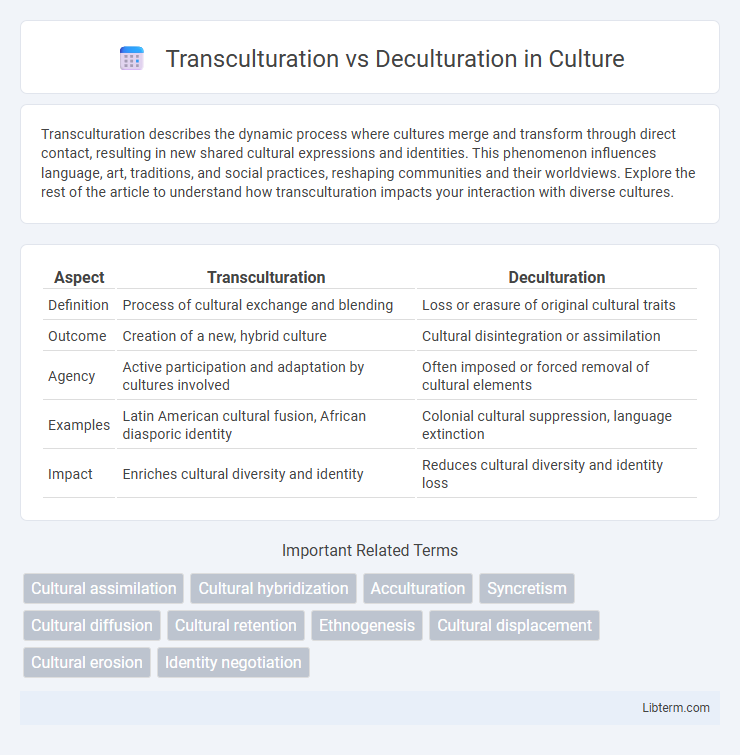Transculturation describes the dynamic process where cultures merge and transform through direct contact, resulting in new shared cultural expressions and identities. This phenomenon influences language, art, traditions, and social practices, reshaping communities and their worldviews. Explore the rest of the article to understand how transculturation impacts your interaction with diverse cultures.
Table of Comparison
| Aspect | Transculturation | Deculturation |
|---|---|---|
| Definition | Process of cultural exchange and blending | Loss or erasure of original cultural traits |
| Outcome | Creation of a new, hybrid culture | Cultural disintegration or assimilation |
| Agency | Active participation and adaptation by cultures involved | Often imposed or forced removal of cultural elements |
| Examples | Latin American cultural fusion, African diasporic identity | Colonial cultural suppression, language extinction |
| Impact | Enriches cultural diversity and identity | Reduces cultural diversity and identity loss |
Introduction to Transculturation and Deculturation
Transculturation refers to the process in which cultural elements, values, and practices are exchanged and merged between different societies, resulting in the creation of new cultural phenomena without the erasure of original identities. Deculturation, in contrast, involves the loss or suppression of a culture, often due to domination or forced assimilation, leading to the diminishing or disappearance of traditional cultural traits. Understanding these concepts is crucial for analyzing cultural interactions and the dynamics of cultural change in multicultural contexts.
Defining Transculturation
Transculturation represents the complex process through which cultures interact, blend, and transform, leading to the creation of new cultural expressions that incorporate elements from multiple origins. Unlike deculturation, which involves the loss or erosion of a culture due to external pressures, transculturation emphasizes cultural exchange and synthesis without the outright abandonment of previous identities. This dynamic process plays a critical role in shaping hybrid cultural identities and fostering mutual understanding in diverse societies.
Understanding Deculturation
Deculturation refers to the process through which individuals or groups lose their original cultural identity, often due to external pressures such as colonization, globalization, or migration. This phenomenon leads to the erosion of language, traditions, and customs, resulting in diminished cultural heritage and social disintegration. Understanding deculturation is essential to addressing challenges related to cultural preservation and identity in multicultural societies.
Historical Roots of Both Processes
Transculturation and deculturation trace their historical roots to colonial encounters and cultural exchanges, where transculturation emerged from the blending and merging of distinct cultural elements, often seen in Latin American societies during Spanish colonization. Deculturation originated from the disruptive impact of colonization or forced assimilation policies, leading to the loss or erosion of indigenous cultural identities and practices. Both processes reflect complex historical dynamics involving power, identity, and cultural transformation over centuries.
Key Differences Between Transculturation and Deculturation
Transculturation involves the merging and converging of cultures, resulting in the creation of new cultural expressions, while deculturation refers to the loss or abandonment of cultural identity and traditions. Transculturation promotes cultural exchange and hybridization, whereas deculturation often leads to cultural erasure and assimilation. Key differences lie in transculturation's emphasis on cultural synthesis and preservation, contrasting with deculturation's focus on cultural disintegration and disappearance.
Cultural Hybridization: A Result of Transculturation
Cultural hybridization emerges as a dynamic outcome of transculturation, where distinct cultural elements merge to create novel, hybrid identities and practices. Unlike deculturation, which involves the loss or erosion of original cultural traits, transculturation fosters mutual exchange and adaptation that enrich cultural diversity. This process promotes intercultural dialogue, blending traditions, languages, and customs into integrated sociocultural frameworks that reflect global interconnectedness.
Consequences of Deculturation on Identity
Deculturation significantly impacts identity by eroding traditional cultural values, languages, and social practices, leading to a loss of communal heritage and individual self-understanding. This process often results in identity confusion, diminished cultural pride, and psychological distress as individuals struggle to reconcile their original culture with imposed dominant norms. The consequences of deculturation also include weakened intergenerational ties and the marginalization of minority groups within broader societies.
Case Studies: Examples in Global Contexts
Transculturation involves the merging and converging of cultures through sustained contact, exemplified by Cuban culture blending African, Spanish, and indigenous influences after colonization. Deculturation refers to the loss or destruction of a culture, as seen in Indigenous communities in North America subjected to forced assimilation policies, resulting in language and tradition erosion. Global case studies highlight transculturation in Latin America's mestizo identities and deculturation in Australia's Aboriginal peoples during European settlement.
The Role of Power Dynamics in Cultural Change
Power dynamics critically shape transculturation by enabling dominant groups to influence or merge cultural traits, leading to new hybrid identities that reflect both resistance and adaptation. In contrast, deculturation often results from oppressive power structures that forcibly erase or suppress subordinate cultures, causing loss of cultural identity and heritage. These processes highlight how unequal power relations determine whether cultural change fosters synthesis or cultural disintegration.
Implications for Modern Societies
Transculturation fosters cultural hybridization by blending elements of diverse cultures, promoting innovation, social cohesion, and multicultural identity within modern societies. Deculturation involves the loss or erasure of cultural traits due to dominant forces, often leading to social alienation, identity crises, and cultural homogenization. Understanding these processes is crucial for policymakers to support cultural preservation and integration strategies that address globalization and migration challenges.
Transculturation Infographic

 libterm.com
libterm.com